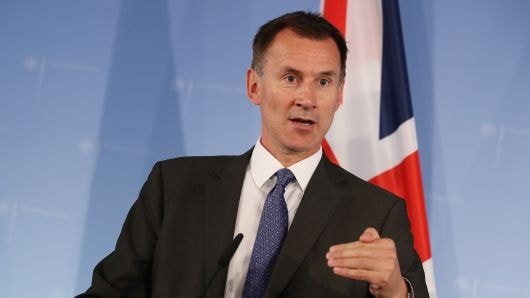Britain plans to maintain close ties with the EU after Brexit
(Baonghean) - On August 23, the British government announced details of the problems London will face if it leaves the European Union (EU) without reaching any agreement. Despite the risk of not reaching an agreement, the country still intends to maintain a close relationship with the EU after Brexit.
 |
British Foreign Secretary Jeremy Hunt said the country would maintain its relationship with the EU. |
In a speech to the press on August 24, British Foreign Secretary Jeremy Hunt said that London wants to maintain close relations with the EU, despite Brexit and expressed hope that agreements can be reached with the EU because, according to him, this is beneficial for both sides.
“The UK remains a great friend and partner of European countries. The British Parliament only agrees to measures that are in line with the spirit of the referendum. That is the only deal that Prime Minister Theresa May and the government can submit,” Mr. Hunt said.
It is known that Mr. Hunt's statement was made in the context that the British government is having to find agreements that satisfy the EU, before Brexit officially takes effect on March 29, 2019. The negotiations between the UK and the EU on the Brexit issue are gradually coming to an end.
Under time pressure, negotiators from both sides have agreed to continue negotiations until the EU Summit at the end of October 2018. Up to now, the UK and the EU have to resolve three major issues before November, including completing the terms of the Brexit Agreement, the issue of the border with Ireland and the draft guidelines for future relations.
Although there is still time to negotiate, the fact that the British government on August 23 officially presented a "black" scenario, or the worst-case scenario for the UK if the current Brexit negotiations fail, shows that they have prepared for the worst that could happen.
Specifically, the British government has detailed issues in 25 areas such as finance, trade, agricultural subsidies, food testing, organ transplants, handling of civil radioactive fuel, etc. that the UK will not be able to resolve. The reason is that these areas are all under the control of laws established by the European Union, so without alternative agreements, the UK and the European Union will not be able to continue to cooperate in these areas.
Explaining the decision to publish this detailed list, UK Brexit Secretary Dominic Raab said that this action is to make businesses and British people aware that the risk of Brexit without a deal is very likely to happen, even though it is not what the British government wants. However, he also affirmed that the UK government's biggest priority is to maintain stability.






.jpg)

